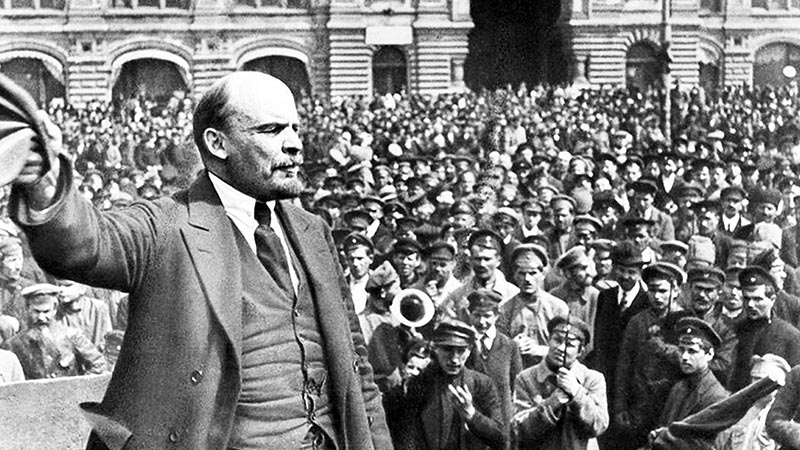The October Revolution

On October 25, 1917, Bolshevik leader Vladimir Lenin led his leftist revolutionaries in a successful revolt against the ineffective provisional government, an event known as the October Revolution.
KEY POINTS
• In the October Revolution (November in the Gregorian calendar), the Bolsheviks, led by Vladimir Lenin, and the workers’ soviets overthrew the Russian Provisional Government in Petrograd.
• The Bolsheviks appointed themselves as leaders of various government ministries and seized control of the countryside, establishing the Cheka to quash dissent.
• The October Revolution ended the phase of the revolution instigated in February, replacing Russia’s short-lived provisional parliamentary government with government by soviets, local councils elected by bodies of workers and peasants.
• To end Russia’s participation in the First World War, the Bolshevik leaders signed the Treaty of Brest-Litovsk with Germany in March 1918.
• Soviet membership was initially freely elected, but many members of the Socialist Revolutionary Party, anarchists, and other leftists created opposition to the Bolsheviks through the soviets themselves.
• When it became clear that the Bolsheviks had little support outside of the industrialized areas of Saint Petersburg and Moscow, they simply barred non-Bolsheviks from membership in the soviets.
• The new government soon passed the Decree on Peace and the Decree on Land, the latter of which redistributed land and wealth to peasants throughout Russia.
• A coalition of anti-Bolshevik groups attempted to unseat the new government in the Russian Civil War from 1918 to 1922.
Decree on Land
Written by Vladimir Lenin, this law was passed by the Second Congress of Soviets of Workers’, Soldiers’, and Peasants’ Deputies on October 26, 1917, following the success of the October Revolution. It decreed an abolition of private property and the redistribution of the landed estates among the peasantry.
Marxism–Leninism
A political philosophy or worldview founded on ideas of Classical Marxism and Leninism that seeks to establish socialist states and develop them further. They espouse a wide array of views depending on their understanding of Marxism and Leninism, but generally support the idea of a vanguard party, one-party state, proletarian state-dominance over the economy, internationalism, opposition to bourgeois democracy, and opposition to capitalism. It remains the official ideology of the ruling parties of China, Cuba, Laos, Vietnam, a number of Indian states, and certain governed Russian oblasts such as Irkutsk. It was the official ideology of the Communist Party of the Soviet Union (CPSU) and the other ruling parties that made up the Eastern Bloc.
Vladimir Lenin
A Russian communist revolutionary, politician, and political theorist. He served as head of government of the Russian Republic from 1917 to 1918, of the Russian Soviet Federative Socialist Republic from 1918 to 1924, and of the Soviet Union from 1922 to 1924. Under his administration, Russia and then the wider Soviet Union became a one-party socialist state governed by the Russian Communist Party. Ideologically a Marxist, he developed political theories known as Leninism.
October Revolution
A seizure of state power by the Bolshevik Party instrumental in the larger Russian Revolution of 1917. It took place with an armed insurrection in Petrograd on October 25, 1917. It followed and capitalized on the February Revolution of the same year. The October Revolution, commonly referred to as Red October, the October Uprising, or the Bolshevik Revolution, was a seizure of state power instrumental in the larger Russian Revolution of 1917. It took place with an armed insurrection in Petrograd on October 25, 1917.
It followed and capitalized on the February Revolution of the same year, which overthrew the Tsarist autocracy and resulted in a provisional government after a transfer of power proclaimed by Grand Duke Michael, brother of Tsar Nicolas II, who declined to take power after the Tsar stepped down. During this time, urban workers began to organize into councils (Russian: Soviet) wherein revolutionaries criticized the provisional government and its actions. The October Revolution in Petrograd overthrew the provisional government and gave the power to the local soviets. The Bolshevik party was heavily supported by the soviets.
Results
The Second Congress of Soviets consisted of 670 elected delegates; 300 were Bolshevik and nearly a hundred were Left Socialist-Revolutionaries, who also supported the overthrow of the Alexander Kerensky Government. The Decree on Land ratified the actions of the peasants who throughout Russia seized private land and redistributed it among themselves. The Bolsheviks viewed themselves as representing an alliance of workers and peasants. The success of the October Revolution transformed the Russian state into a soviet republic. A coalition of anti-Bolshevik groups attempted to unseat the new government in the Russian Civil War from 1918 to 1922.



